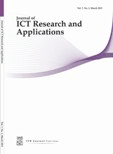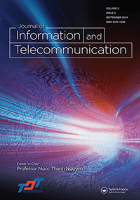
IEEE Open Journal of the Computer Society
Scope & Guideline
Unlocking Innovative Insights in Technology
Introduction
Aims and Scopes
- Artificial Intelligence and Machine Learning:
Research on AI and ML methodologies, including deep learning, federated learning, and their applications in various domains such as healthcare, security, and natural language processing. - Blockchain Technology:
Exploration of blockchain applications, security frameworks, and decentralized systems, particularly in the context of Web 3.0, the metaverse, and supply chain management. - Internet of Things (IoT) and Cyber-Physical Systems:
Studies focusing on the integration of IoT within various environments, addressing challenges related to security, data management, and system optimization. - Computer Vision and Image Processing:
Innovative techniques in image analysis, recognition, and processing, with applications ranging from medical imaging to augmented reality. - Network Security and Privacy:
Research addressing security protocols, privacy-preserving techniques, and the resilience of networks against various cyber threats. - Human-Computer Interaction and Affective Computing:
Investigations into the interaction between humans and computers, emphasizing emotional intelligence and user experience.
Trending and Emerging
- Federated Learning and Privacy Preservation:
As concerns over data privacy increase, federated learning has emerged as a crucial topic, allowing collaborative model training while keeping data decentralized and private. - AI in Healthcare:
The application of AI and ML techniques in healthcare, particularly for diagnostic purposes and patient management, has seen a surge in research, driven by the need for innovative solutions in medical technologies. - Metaverse and Virtual Environments:
Research focused on the metaverse, including its technical underpinnings, security frameworks, and user interaction dynamics, is rapidly growing, reflecting the rising interest in immersive digital experiences. - Advanced Security Protocols for IoT:
With the proliferation of IoT devices, there is an increasing emphasis on developing robust security protocols that address the unique vulnerabilities associated with interconnected systems. - Quantum Computing and Blockchain Integration:
Emerging studies are exploring the intersection of quantum computing and blockchain technology, focusing on enhancing security measures and computational efficiency in decentralized systems.
Declining or Waning
- Traditional Software Development Methodologies:
As the field shifts towards agile and DevOps practices, traditional methodologies in software development have received less attention, overshadowed by newer frameworks that emphasize flexibility and rapid iteration. - Static Network Protocols:
Research on static, traditional network protocols has diminished as dynamic and adaptive networking solutions gain prominence in addressing modern connectivity challenges. - Basic Data Structures and Algorithms:
While foundational knowledge remains vital, there is a noticeable reduction in publications focused solely on basic data structures and algorithms, as the community increasingly prioritizes application-driven research and advanced computational techniques. - Legacy System Integration:
The relevance of research on integrating legacy systems is waning, as organizations are progressively moving towards cloud-based solutions and microservices architectures, thereby reducing the need for legacy compatibility studies.
Similar Journals

Journal of ICT Research and Applications
Elevating Innovations in Information and Communication TechnologyJournal of ICT Research and Applications, published by ITB JOURNAL PUBL, is a prominent open-access journal since 2013 that serves as a vital platform for disseminating innovative research in the fields of Information and Communication Technology. Based in Indonesia, this journal provides a valuable resource for researchers, professionals, and students interested in the evolving landscape of computer science, electrical engineering, and information systems. Though currently placed in Q4 across its relevant categories for the year 2023, the journal aims to enhance its visibility and impact within the academic community by inviting high-quality submissions that explore interdisciplinary approaches and novel applications of ICT. With its transparent open-access model, the Journal of ICT Research and Applications ensures that research findings are readily accessible, fostering collaboration and knowledge sharing among scholars worldwide. Its commitment to advancing ICT research and practices solidifies its role as a meaningful contributor to these dynamic fields.

Journal of Information and Telecommunication
Connecting Minds, Advancing Knowledge in Information and Telecommunication.Journal of Information and Telecommunication, published by TAYLOR & FRANCIS LTD, is a distinguished open access journal that has been enhancing the global discourse since its establishment in 2017. With an ISSN of 2475-1839 and an E-ISSN of 2475-1847, this journal is located in the United Kingdom and dedicates its focus to the fields of information technology, telecommunications, and related disciplines. Boasting a respectable Q2 quartile ranking across various categories including Computer Networks and Communications, Electrical and Electronic Engineering, and Computer Science Applications in 2023, it ranks notably in the top percentiles of scopus rankings, asserting its significance in the academic community. The journal's commitment to open access since its inception has fostered widespread accessibility, encouraging research dissemination and collaboration on a global scale. By providing a platform for high-quality research, it aims to unite researchers, professionals, and students in their pursuit of innovation and excellence in the ever-evolving digital landscape.

Machine Intelligence Research
Connecting Global Minds in AI ResearchMachine Intelligence Research is a premier academic journal published by SPRINGERNATURE, dedicated to advancing knowledge in the rapidly evolving fields of Artificial Intelligence, Applied Mathematics, and more. With its ISSN 2731-538X and E-ISSN 2731-5398, the journal is recognized for its impact, holding a distinguished position in various Q1 categories for 2023, including Computer Vision and Pattern Recognition and Control and Systems Engineering. Operating under an Open Access model, it ensures that groundbreaking research from China and around the world remains accessible to a global audience, promoting collaboration and innovation. As a beacon for researchers, professionals, and students, Machine Intelligence Research aims to disseminate high-quality research findings, innovative methodologies, and influential theories, thereby shaping the future landscapes of science and technology.

JOURNAL OF COMPUTER SCIENCE AND TECHNOLOGY
Empowering Research in the Digital AgeJOURNAL OF COMPUTER SCIENCE AND TECHNOLOGY, published by Springer Singapore Pte Ltd, is a pivotal platform in the rapidly evolving realms of computer science and technology. With an ISSN of 1000-9000 and an E-ISSN of 1860-4749, this journal encompasses a diverse array of topics including computational theory, hardware and architecture, software engineering, and applications of computer science. Spanning over three decades from 1986 to 2024, it boasts an impressive standing within academic circles, ranking in the Q2 quartile across several key categories and achieving notable placement in Scopus metrics. Although this journal operates under a subscription-based model, it remains a crucial resource for researchers, professionals, and students seeking to advance their knowledge and contribute to discussions in computer science. The JOURNAL OF COMPUTER SCIENCE AND TECHNOLOGY is committed to fostering innovation and scholarly communication in the field, encouraging submissions that contribute substantive advancements in theory and application.

Computers
Transforming Knowledge into Technological InnovationComputers is a leading journal published by MDPI, dedicated to advancing research in the fields of computer networks and communications, as well as human-computer interaction. Since its inception in 2012, it has established itself as a vital resource for scholars and practitioners, achieving an impressive Q2 ranking in Computer Networks and Communications and a Q3 ranking in Human-Computer Interaction as of 2023. The journal is indexed in Scopus, highlighting its relevance with a rank of #135/395 and #72/145 in their respective categories. Published in Switzerland, this open-access journal ensures widespread dissemination of research findings, supporting the global academic community in enhancing technologies relevant to computer science. Access options are available, fostering an environment where knowledge is shared freely. With an emphasis on innovation, redesign, and collaboration between humans and technology, Computers plays a crucial role in shaping the future of digital interactions.

AUTOMATIC CONTROL AND COMPUTER SCIENCES
Bridging Theory and Practice in Control and ComputingAUTOMATIC CONTROL AND COMPUTER SCIENCES is an esteemed academic journal dedicated to the exploration and advancement of automation, control systems, and computer science disciplines. Published by PLEIADES PUBLISHING INC, this journal serves a global audience from its base in the United States and provides a platform for high-quality research and innovative applications across its converged years, spanning from 1973 to 2024. As of 2023, it is categorized in Q3 in Control and Systems Engineering and Q4 in both Signal Processing and Software, reflecting its valuable contributions to these fields of study. Despite its modest rankings in Scopus, it demonstrates a commitment to disseminating knowledge and fostering scholarly dialogue among researchers and practitioners. Although not an open-access journal, AUTOMATIC CONTROL AND COMPUTER SCIENCES remains vital for academics seeking to deepen their understanding and expertise in control theories and computational methodologies.

Future Internet
Illuminating the Path of Internet Research and DevelopmentFuture Internet is a leading open-access journal published by MDPI, dedicated to advancing the field of Internet technologies and communication networks. Since its inception in 2009, the journal has provided a platform for rigorous research and innovative ideas in the context of the rapidly evolving digital landscape. Based in Switzerland, it has established itself as a prominent publication, earning a commendable Q2 ranking in the category of Computer Networks and Communications for 2023. With a Scopus ranking of #87/395 and a notable 78th percentile, Future Internet fosters interdisciplinary collaboration, making valuable contributions to the understanding of Internet systems, protocols, and applications. Researchers, professionals, and students alike will find a wealth of insightful articles addressing both theoretical foundations and practical implementations. The open-access format ensures that all readers have immediate and unrestricted access to high-quality research, facilitating knowledge dissemination and informed decision-making in academia and industry alike.

PeerJ Computer Science
Advancing Open Access in Computer Science ResearchPeerJ Computer Science is a leading open access journal published by PEERJ INC, dedicated to the field of computer science. Since its inception in 2015, it has made significant strides in promoting scholarly communication and accessibility to cutting-edge research. With an impressive impact factor reflected by a Q1 ranking in the Computer Science (miscellaneous) category and a Scopus rank of 51 out of 232, this journal stands at the forefront of its field. The journal's open access model ensures that groundbreaking findings are readily available to researchers, professionals, and students alike, fostering collaboration and innovation in the ever-evolving landscape of computer science. As it continues to publish until 2024 and beyond, PeerJ Computer Science remains an essential resource for those seeking to stay ahead in their research and practice.

Internet Technology Letters
Empowering Researchers with Insights into Digital Innovations.Internet Technology Letters, published by John Wiley & Sons Ltd, is a dynamic and rapidly evolving journal that focuses on the innovative applications and developments within the realms of Artificial Intelligence, Computer Networks and Communications, Information Systems, and Software. With its E-ISSN 2476-1508 and a defined convergence period from 2018 to 2024, this journal seeks to address emerging trends and critical challenges confronting the digital landscape today. Recognized in the Q3 quartile range across multiple computer science categories in 2023, it serves as a valuable resource for researchers, professionals, and students seeking to advance their knowledge and stay updated on significant technological advancements. While currently not an open-access journal, Internet Technology Letters holds a prominent position on platforms like Scopus, ranked within the middle percentiles, reflecting its contribution to the academic community. The journal aims to foster connectivity between academia and industry, encouraging submissions that promote interdisciplinary collaboration and innovation. By creating a platform for sharing groundbreaking research, Internet Technology Letters plays a crucial role in shaping future technological landscapes.

Cybersecurity
Fostering Global Collaboration in Cybersecurity SolutionsCybersecurity, published by SpringerNature, serves as a pivotal platform in the realms of Artificial Intelligence, Information Systems, Software, and Computer Networks and Communications. With an impressive Impact Factor and an Open Access model initiated in 2018, this journal facilitates widespread dissemination of innovative research findings to a global audience. Based in the United Kingdom, Cybersecurity aims to advance knowledge and application in security innovations, risk management, and system resilience against cyber threats. The journal's current standing is prominently reflected in its Q1 and Q2 ratings across various computer science categories, indicating its reputable contribution to the academic community. By continuously publishing cutting-edge research, Cybersecurity plays a crucial role in informing policy decisions, advancing technology, and enhancing the collective understanding of cyber resilience, making it an essential resource for researchers, professionals, and students alike.